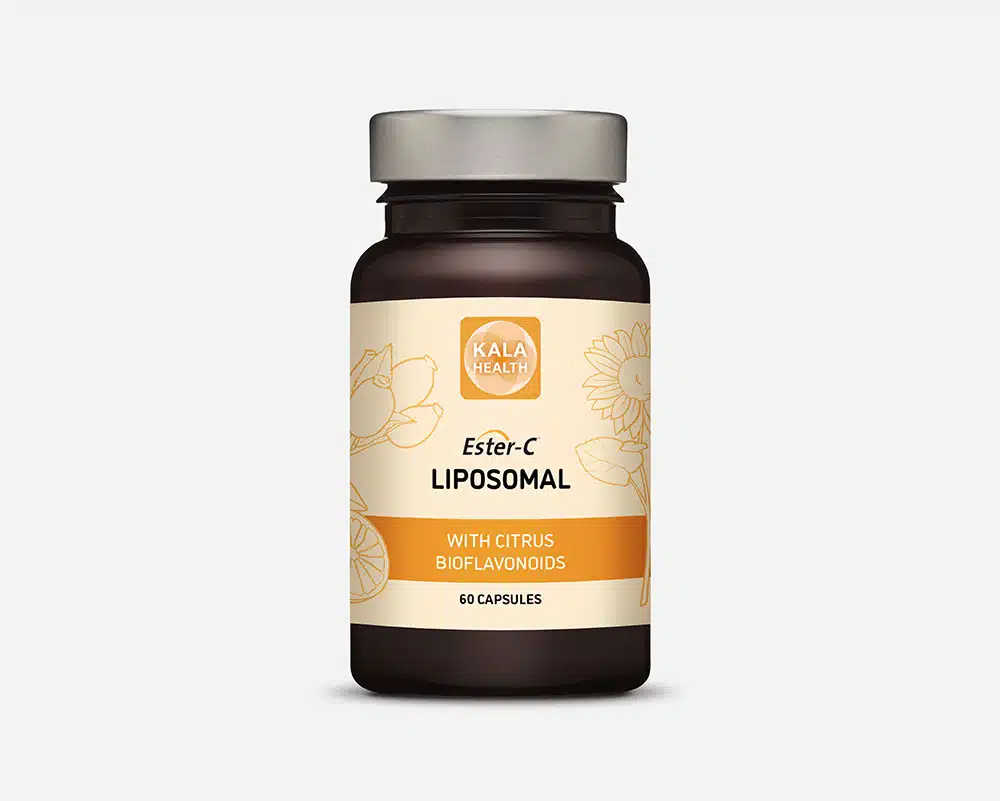Cordyceps Vegan Capsules BIO
- Suitable for vegans: 100% vegetable
- With active ingredients: as arabinoxylans and glycoproteins
- Completely organic: Grown in a clean and organically certified nursery
Description
Vegan Cordyceps Sinensis
Kala Health Cordyceps consists of vegetable capsules containing 800 mg of the original mushroom Cordyceps sinensis, grown in a sterile environment on an organically certified farm.
The mushroom is grown on a soil of organic, whole grain rice. The valuable nutrients in the organic rice are absorbed by the mushroom. The crop is harvested as soon as the mycelia (fungal threads) have overgrown the rice and the first fruiting bodies (mushrooms) develop. After drying and grinding, the powder is shipped and encapsulated.
The combination of mycelia (fungal threads) and young fruiting bodies (mushrooms) guarantees the presence of all valuable substances in Kala Health Cordyceps.
- Cordyceps sinensis freeze-dried powder
- From 100% organic cultivation
- 100% vegetarian and vegan
- Contains the active ingredients of both mycelia and mushrooms
- Grown at an organically certified farm
For more information, see “Background Information”.
Composition
Ingredients: Cordyceps* (Cordyceps sinensis), hydroxypropyl methylcellulose (vegetarian capsule).
*of biological origin
Does not contain soy, lactose, yeast, sugar, starch, gluten or conservatives, nor artificial fragrances, colourings and flavourings. This product is suitable for vegetarians and vegans.
This product is a dietary supplement (mushroom mycelium).
Storage: Dry, sealed and at room temperature, out of reach of children
Ingredients
| Composition per 2 capsules (daily dosage): | %RI* | |
|---|---|---|
| Cordyceps Sinensis Mycelia | 1600 mg | – |
* RI = Reference intake
Ingredients: Cordyceps* (Cordyceps sinensis).
Other ingredients: Hydroxypropyl methylcellulose (vegetarian capsule).
Guaranteed free from: Preservatives, synthetic fragrances, colors and flavors.
Use & dosage
Recommended use
| For whom | Daily dose |
|---|---|
| Adults: | 1 to 2 capsules twice daily |
Daily dosage: Adults 1 to 2 capsules twice daily, or as recommended. Preferably take during a meal. Please adhere to the (recommended) daily dosage.
Mandatory statement: A nutritional supplement is not a substitute for a varied diet. A varied, balanced diet and a healthy lifestyle are important. This product is a dietary supplement (mushroom mycelia).
Safety: Consult an expert before using supplements in case of pregnancy, lactation, medication use and illness.
Storage advice
Storage: In a dry place at room temperature, out of the reach of small children.
Background information
WHAT IS CORDYCEPS?
“Cordyceps” is the name of the mushroom Cordyceps sinensis. For thousands of years, Cordyceps was known as the mysterious organism capable of alternately taking the form of an animal worm and vegetable grass. The Chinese therefore called it “dong chong xia cao”, or “winter worm, summer grass”. Today we know that it is not in fact a single organism, but a complicated, parasitic relationship between two organisms: a caterpillar and a fungus.
Cordyceps sinensis is a rare mushroom, mainly found at 3000 – 5000 meters altitude in the humid meadows of the Himalayan high mountains and other mountain ranges in Tibet and China. The main host of Cordyceps sinensis is the caterpillar of the family Hepialidae (Root Borers), a group of moths whose caterpillar feeds underground on the roots of all kinds of plants. Cordyceps sinensis parasitizes the caterpillar by infiltrating them as a spore and then eating them from the inside. What remains is the mummified outside of the caterpillar, which is completely filled on the inside with fungal threads (“winter worm”). During the summer months, the fruiting body of the fungus grows from the back of the mummy’s head above the soil. This mushroom is slender and finger-shaped, without a cap (“summer grass”). The Latin name “Cordyceps” (literally: swollen head) directly refers to the growth habit of the mushroom from the caterpillar mummy.
To reassure you: Kala Health Cordyceps consists entirely of fungal pathogens, grown on organic rice. The caterpillar is no longer involved.
The importance of organic cultivation: SKAL certified
Because mushrooms reflect the environment in which they grow, the quality of the mushrooms is of utmost importance. Mushrooms are able to absorb and convert almost all substances from the soil, both valuable and possibly harmful. Mushrooms growing in a polluted environment can also absorb these contaminants. For this reason, Kala Health does not use wild mushrooms from uncontrollable areas in uncontrollable countries.
Kala Health Cordyceps comes from a certified organic nursery. The cultivation takes place on a medium of organic rice, under completely sterile conditions. The valuable nutrients in the organic rice are absorbed by the mushrooms. The crop is harvested as soon as the mycelia (fungal threads) have overgrown the rice. After drying and grinding, the powder is shipped and encapsulated by Kala Health.
The mushrooms are guaranteed free of heavy metals, pesticides, chemical residues and bacteria. To this end, harvests are regularly analyzed by an independent laboratory. For the EU, the Kala Health Cordyceps product has been awarded the SKAL Organic certificate.
Cordyceps Sinensis: The Benefits
Cordyceps sinensis is a mushroom that has been known in the East for centuries and on which a lot of scientific research has been conducted. Many hundreds of substances have been found in this mushroom, some of which are ‘old acquaintances’ such as vitamins, minerals and amino acids. The protein content in mushrooms generally varies between 10 – 40% dry weight. What is special is that ALL essential amino acids and almost all non-essential amino acids are present, as well as almost all vitamins, minerals and trace elements. The content of vitamin B2 generally varies between 1.8-5.1 mg/100 g dw, and that of vitamin B3 and folic acid between 31-65 respectively. 0.36-0.64 mg/100 g dw (1).
These ingredients alone make Cordyceps sinensis an extremely valuable food source. However, it contains many more biologically active ingredients, and new, promising ingredients are still being isolated. Below is an overview of the currently known ingredients:
- Proteins, peptides, cyclic dipeptide
- ALL essential amino acids (!)
- Most non-essential amino acids
- Unsaturated fatty acids
- Vitamins
- Minerals and trace elements
- Enzymes (more than 200 known)
- Polysaccharides, including beta (1,3), (1,4), (1,6) glucans, hetero-beta-glucans and proteoglycans (protein polysaccharide complexes)
- Triterpenes (more than 100 known)
- Sterols
- Nucleosides
- Nucleotides
- Steroids, including ergosterol (provitamin D2)
Arabinoxylans and glycoproteins
In November 2003, the results of a study into the active ingredients of a number of mushroom mycelia were published in the leading journal International Journal of Medicinal Mushrooms (1).
Substances in mushroom mycelia that are gaining increasing attention are:
- Polysaccharides (particularly the 1,3 and 1,6 beta-glucans): large molecules of compound sugars;
- Glycoproteins: combinations of proteins and polysaccharide complexes;
- Ergosterol: converted into provitamin D2 under the influence of sunlight;
- Arabinoxylans: formed from arabinose and xylose in whole grain rice under the influence of mushroom mycelia.
This research shows that Kala Health Cordyceps is a particularly rich source of arabinoxylans, glycoproteins, ergosterol and beta-glucans (1):
| Kind | Arabinoxylanen | Glycoproteïnen | Ergosterol | Beta-glucanen | |||
| Typ | (mg/g) | ||||||
| 1,3 | 1,4 | 1,6 | |||||
| Griola | 113 | 399 | 17 | + | + | +++ | 25 |
| Agaricus | 78 | 387 | 19 | ++ | – | ++ | 18 |
| Inonotus | 93 | 309 | 18 | +++ | – | ++ | 30 |
| Ganoderma | 110 | 285 | 15 | +++ | – | + | 22 |
| Cordyceps | 240 | 322 | 68 | ++ | – | ++ | 21 |
| Phellinus | 197 | 198 | 37 | ++ | – | ++ | 28 |
| Hericium | 239 | 216 | 37 | ++ | – | + | 12 |
(1): Stamets P. 2003: Potentiation of cell-mediated host defence using fruitbodies and mycelia of medicinal mushrooms. International Journal of MedicinalMushrooms. Vol. 5: 179-191.
Want to buy Cordyceps?
Are you interested in purchasing Cordyceps? You can do that at the top of the page. For more information, call +31 (0)70-345-0290, or send an email to info@kala.eu.


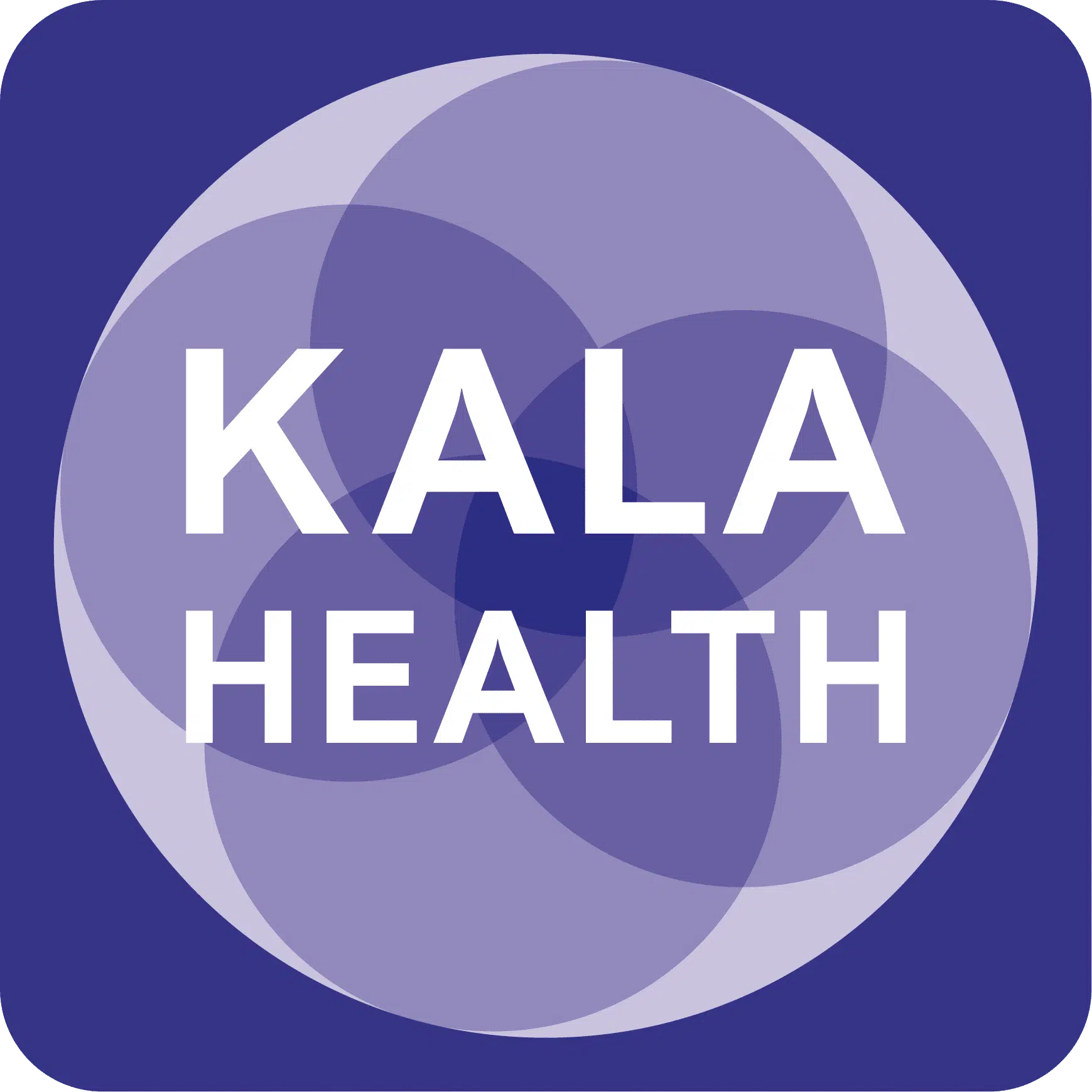
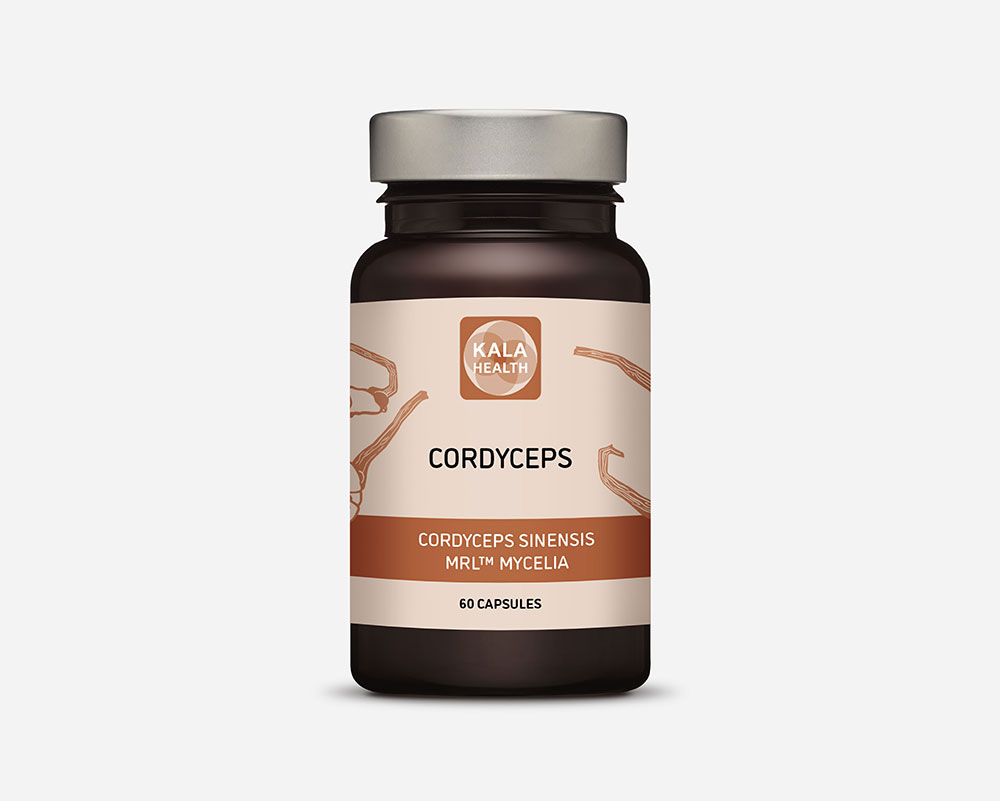
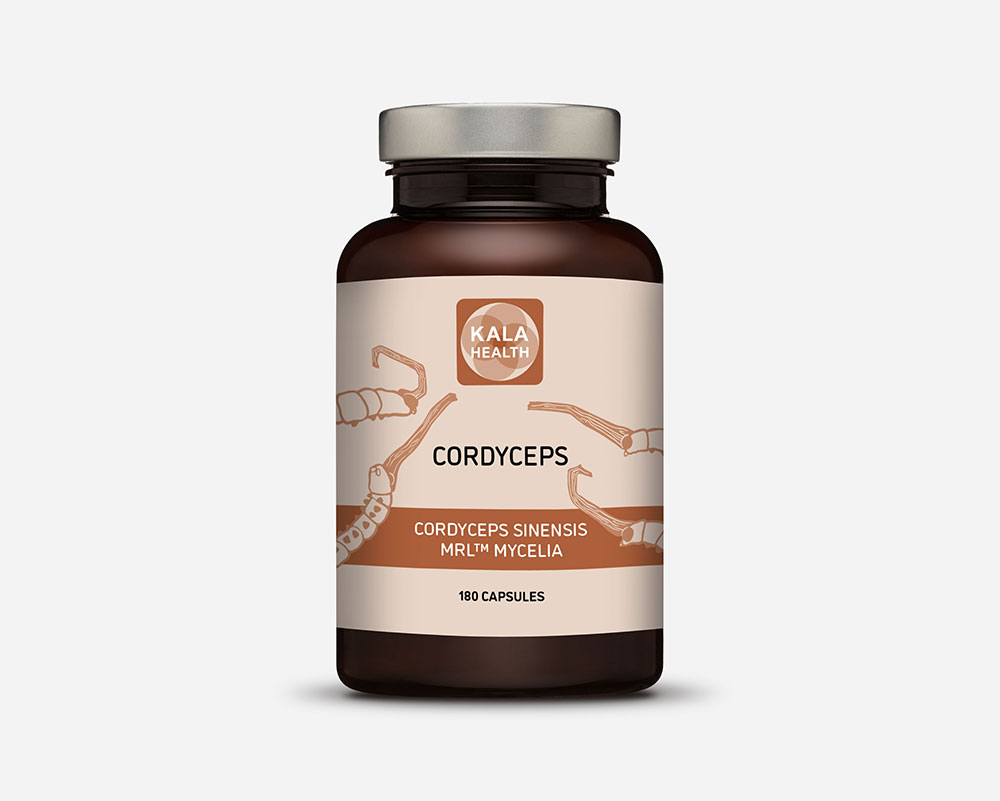
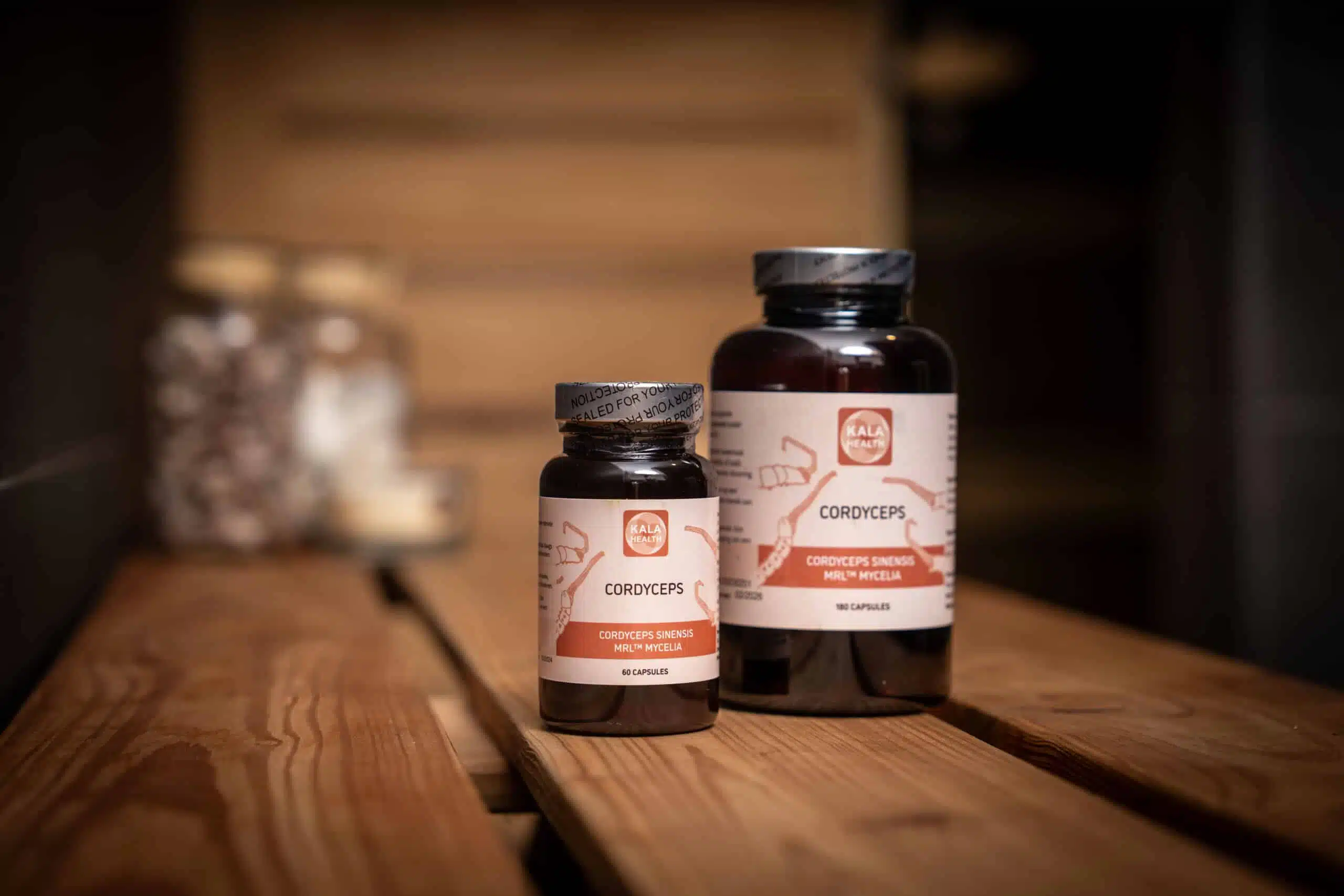
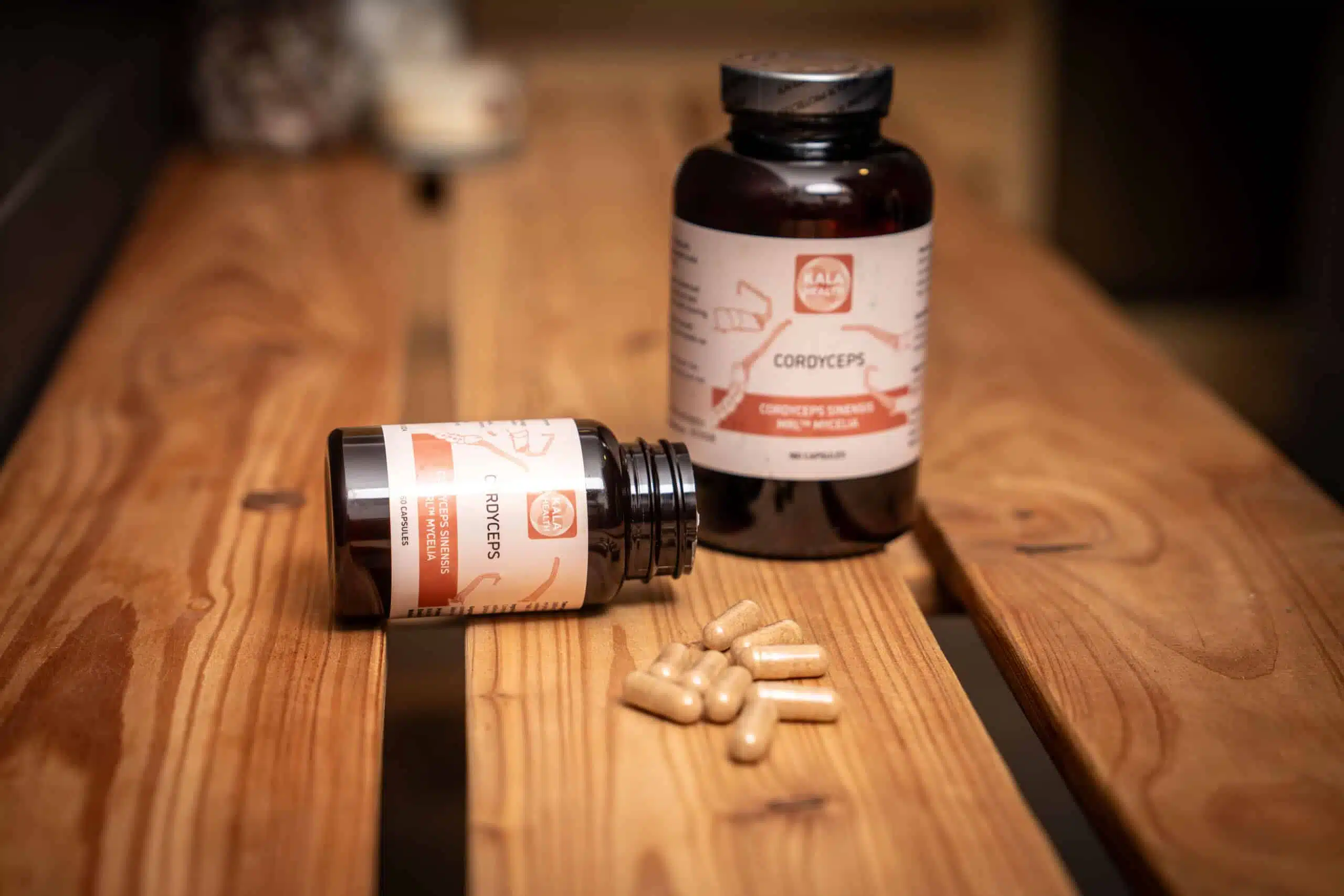
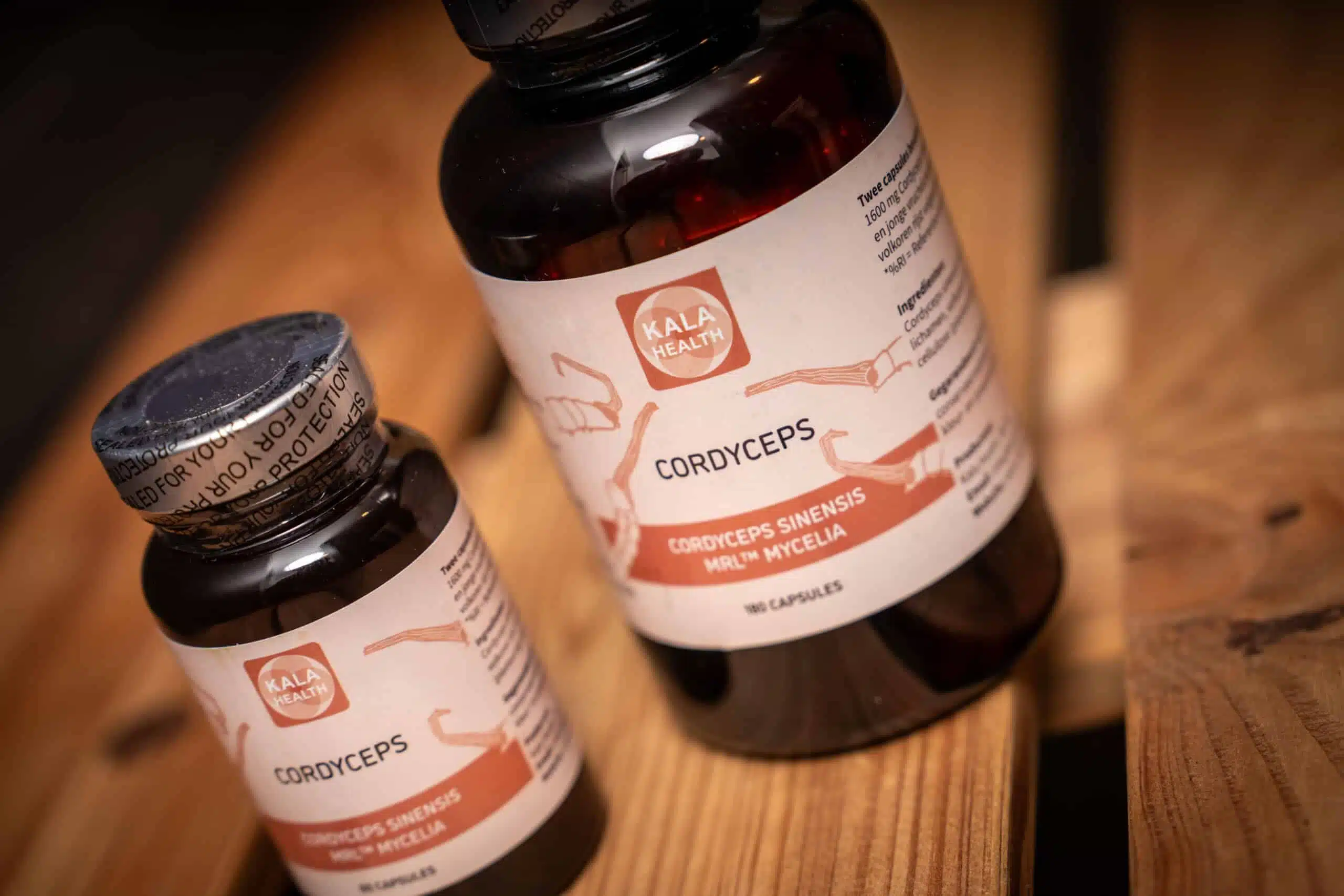




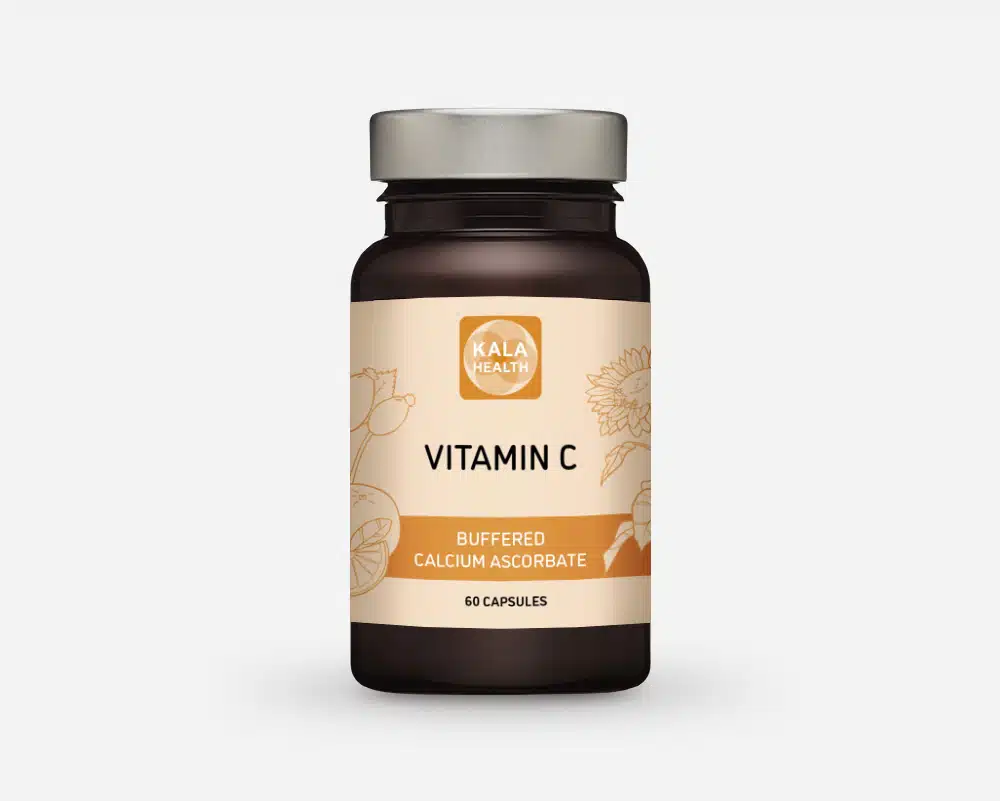
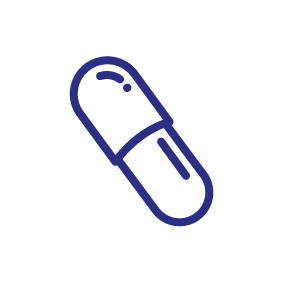 60, 180 or 365 capsules
60, 180 or 365 capsules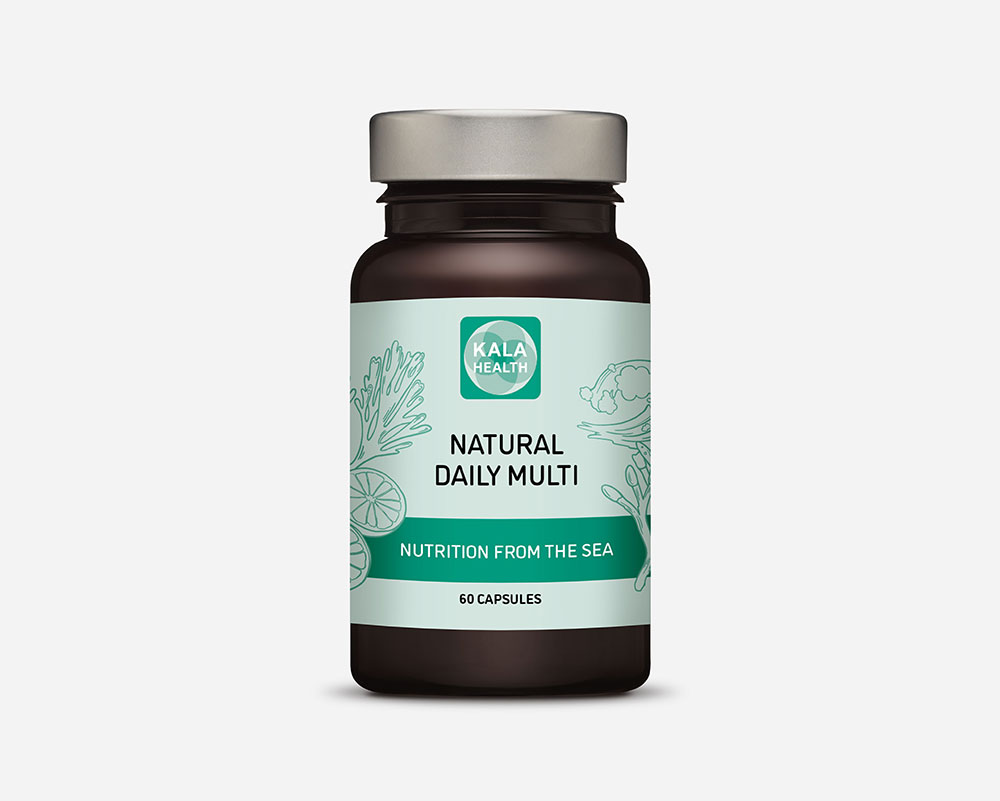
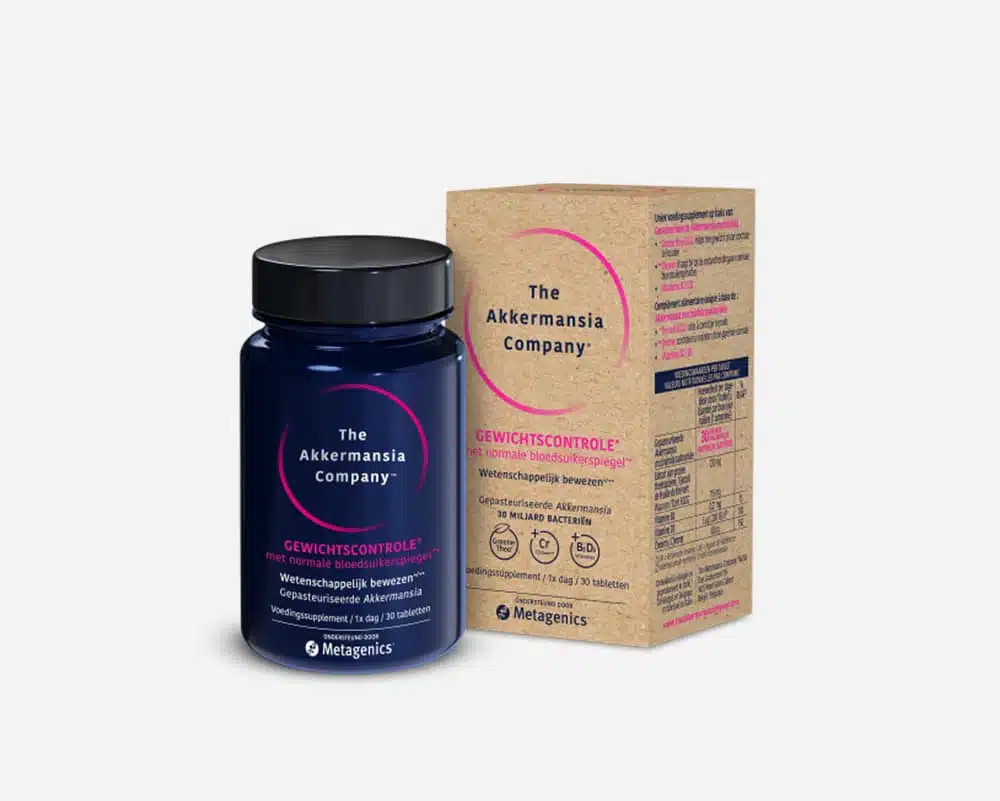
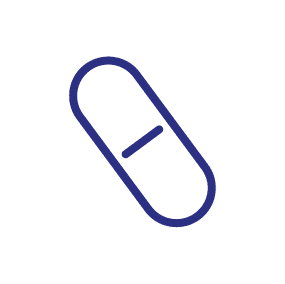 30 Tablets
30 Tablets